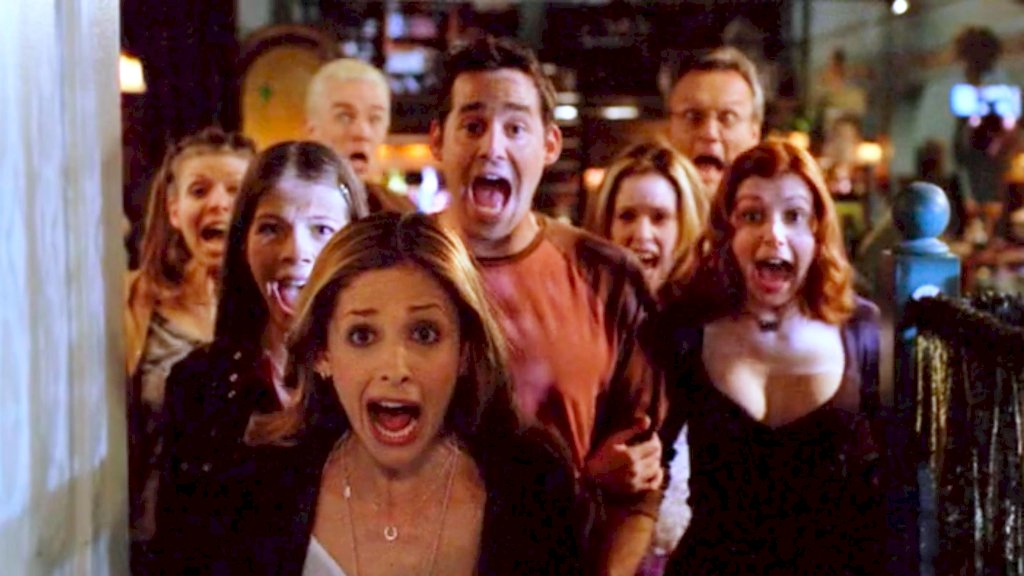In the annals of television history, few series have left as indelible a mark as "Buffy the Vampire Slayer." Premiering in 1997, this supernatural drama, created by Joss Whedon, was far more than a typical teen show; it was a genre-defying masterpiece that skillfully combined elements of horror, comedy, drama, and feminism to create a narrative that resonated with viewers of all ages. Over the course of seven seasons, "Buffy the Vampire Slayer" evolved from a cult classic to a cultural phenomenon, earning its place as one of the greatest television series of all time.

The Birth of the Slayer

"Buffy the Vampire Slayer" introduces us to Buffy Summers, played by the talented Sarah Michelle Gellar, a seemingly typical teenage girl who just wants to fit in at her new high school in Sunnydale. However, Buffy is far from ordinary; she's the latest in a long line of young women chosen to be the Slayer, a warrior destined to battle vampires, demons, and other supernatural forces that threaten the world.
The brilliance of the show lies in its juxtaposition of the supernatural with the mundane trials and tribulations of adolescence. While Buffy battles creatures of the night, she also navigates the complexities of high school, friendship, and family. This blend of genres set "Buffy" apart from other series and made it accessible to a wide audience.
A Strong Ensemble Cast

"Buffy the Vampire Slayer" boasts a talented ensemble cast that brought the characters to life in unforgettable ways. From the charming and witty Xander (Nicholas Brendon) to the bookish and lovable Willow (Alyson Hannigan), each character was fully developed, allowing viewers to connect with them on a personal level.
Of course, one cannot discuss the show's characters without mentioning the enigmatic vampire with a soul, Angel (David Boreanaz), and the morally ambiguous Spike (James Marsters). These two vampires brought depth and complexity to the series, adding layers to Buffy's journey and raising questions about redemption, love, and the human condition.
Feminism and Empowerment

At its core, "Buffy the Vampire Slayer" was a feminist narrative that challenged traditional gender roles and tropes. Buffy was not just a victim; she was a powerful heroine who took charge of her destiny and fought against the forces of evil. The show subverted the damsel-in-distress stereotype, portraying women as strong, capable, and resourceful.
The character of Buffy served as a symbol of female empowerment. She wasn't defined by her relationships with men but by her strength, intelligence, and resilience. Her journey from a reluctant Slayer to a confident leader sent a powerful message to viewers, especially young women, about the importance of self-belief and the ability to overcome adversity.
Social Commentary Through Metaphor

"Buffy the Vampire Slayer" was more than just a supernatural drama; it was a platform for social commentary. The show used metaphorical storytelling to address real-world issues, such as addiction, identity, and the struggles of adolescence. Vampires, demons, and other supernatural creatures served as allegorical representations of these challenges, allowing the audience to relate on a deeper level.
One of the most memorable metaphors was the use of vampires as symbols of addiction. Buffy's battles with bloodsuckers mirrored the struggles of those dealing with substance abuse. The show didn't shy away from the dark and painful aspects of addiction, making it an allegorical exploration of a very real issue.
The Complex Villains

"Buff the Vampire Slayer" is also renowned for its multifaceted villains. The most iconic among them was Angel (David Boreanaz), a vampire cursed with a conscience. Angel's love story with Buffy was both passionate and tragic, demonstrating the show's ability to explore the gray areas of morality.
Another unforgettable antagonist was Spike (James Marsters), a punk-rock vampire with a twisted sense of humor. Spike eventually underwent significant character development, evolving from a ruthless killer into a heroic figure, which illustrated the series' theme of redemption.
Legacy and Cultural Impact

"Buffy the Vampire Slayer" not only garnered critical acclaim but also left an indelible mark on popular culture. It inspired a devoted fanbase, known as "Buffyites" or "Scoobies," who continue to celebrate the show through conventions, fan fiction, and online communities. The series also paved the way for other genre-bending shows that challenge traditional storytelling norms.
Furthermore, "Buffy" has been studied in academia for its cultural significance and its exploration of complex themes. It remains a topic of discussion in gender studies, film and television analysis, and pop culture studies.
Conclusion

In conclusion, "Buffy the Vampire Slayer" is a television masterpiece that defied genres, challenged stereotypes, and left an enduring legacy in the world of entertainment. Through its richly developed characters, witty writing, and exploration of complex themes, it continues to captivate audiences and inspire new generations of viewers. "Buffy" is more than just a TV show; it's a cultural phenomenon and a testament to the power of storytelling to transcend boundaries and connect with audiences on a profound level.


